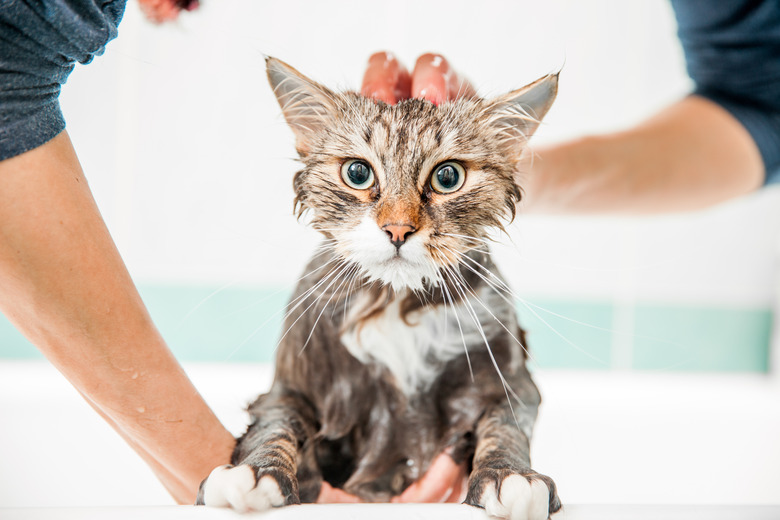Is Dawn Dish Soap Safe For Cats? Here's How To Wash A Cat With Dawn Dishwashing Detergent
There's nothing as adorable as a litter of kittens happily playing together. Kittens bring joy — and lots of activity — to a household. If those kittens are infested with fleas, however, that joy quickly turns to concern. Not only can fleas invade your house, but too many of them can kill a young cat, causing anemia through blood loss.
Unfortunately, you can't use commercial flea removal products on young kittens, as these flea killers are too harsh for a baby with an immature immune system. What you can do to eradicate fleas on kittens is wash them in Dawn dishwashing liquid. Dawn is safe for kittens when used properly. Of course, even though kittens are tiny, they still have claws and teeth, so make sure to protect yourself during the process.
Only Dawn, original blue
Only Dawn, original blue
Although dishwashing liquids may prove interchangeable for washing crockery, that's not the case when it comes to washing felines. Don't substitute Dawn for whatever dishwashing liquid is near your kitchen sink, and don't use any version but the original, blue Dawn. What special properties does Dawn have that other dishwashing detergents don't? As Pest Policy points out, this dishwashing liquid is especially effective at drowning fleas.
Dawn contains surfactants, which reduce surface water tension. That means fleas will sink and drown in water containing Dawn rather than float on the surface and possibly survive. It's hard to drown fleas because their respiratory system includes a layer of wax that keeps water from entering the body. Dawn breaks through that layer, so water enters the flea's respiratory system and drowns the insect.
Bathing felines in Dawn
Bathing felines in Dawn
The good news about bathing felines with Dawn is that you don't have to stick the entire cat in a tub. That's generally a recipe for mayhem no matter how well you have protected yourself with gloves and long-sleeved clothing in a sturdy fabric. Place a few good squirts of Dawn into a basin filled with warm water. Stir the mix thoroughly.
Take a flea comb and dip it into the basin. Comb the cat thoroughly, placing fleas caught in the comb's tines into the basin for drowning. Keep on combing until it appears no more fleas are on the cat. Since it's quite possible that you missed a flea or two — and they breed rapidly — repeat the process in a few days until you are certain the cat is flea-free.
Post-bathing rituals
Post-bathing rituals
Once you have gotten the fleas off your cat, brush him and towel dry him vigorously. Unlike commercial pet shampoos, you don't have to rinse Dawn off your pet since you shouldn't produce large amounts of suds. The Dawn residue will help keep the flea population down. Make sure kittens, especially, are placed in a warm room until they are completely dry.
Dawn precautions
Dawn precautions
Although Dawn is relatively safe for cats, as Flea Science , the product is harsher than shampoos designed for felines. That's why most owners use shampoos specifically created for cats if they must wash their pets. However, flea shampoos for cats are still too strong for kittens, and that's one reason Dawn has become a staple in the repertoire of rescuers and fosters caring for neglected kittens. Once the cats are old enough, it's wise to use products meant to eliminate fleas on felines or give them a thorough washing rather than rely on Dawn.
You can always use Dawn in a pinch on a cat that needs bathing but don't use it on an animal with an active skin infection. If that's the case, take the cat to your vet for treatment. For any cat, bathing more than once a month will dry out the skin, although when it comes to fleas, the decision is a balance between dry skin and biting, possibly disease-carrying insects.
